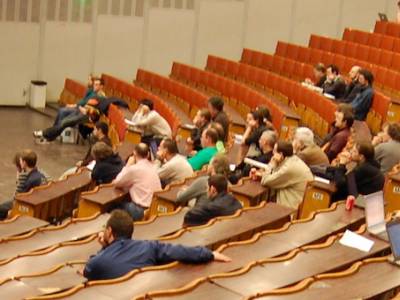I have a question regarding the 'academic challenge' posed by Harvard and Yale. I have hear it said before that if you are looking for a year of pure academic stimulation, then the LLM in Harvard is not the way to go. (This view was in relation to a post where one person had a choice between Harvard and Oxford, and wished to know which provided more of a challenge.)
So my question is simply this, does the Yale LLM pose an academic challenge greater than that of Harvard, and similar to that which Oxford and Cambridge would offer to a student looking for pure academic stimulation before becoming an Attorney/Barrister/Solicitor? Or is the Harvard LLM just as challenging as the rest?
And views on this would be great. If you happen to have gone to all 4 you would probably be in the best position to comment! Further, if you have attended all 4, I doff my cap to you sir. Good show! LOL
Harvard and Yale
Posted Dec 19, 2007 00:48
So my question is simply this, does the Yale LLM pose an academic challenge greater than that of Harvard, and similar to that which Oxford and Cambridge would offer to a student looking for pure academic stimulation before becoming an Attorney/Barrister/Solicitor? Or is the Harvard LLM just as challenging as the rest?
And views on this would be great. If you happen to have gone to all 4 you would probably be in the best position to comment! Further, if you have attended all 4, I doff my cap to you sir. Good show! LOL
Posted Jan 07, 2008 01:50
My opinion might not be objective but I believe a lot of people forget about Chicago's LL.M... I can assure you it is a real academic challenge. The rate of admissions to the LL.M. is barely above 7% (one of the lowest in all the US LL.M. programs) and both the LL.M. and J.D. programs are really small (no more than 550 students approx.). If you are looking for academic challenge you will be delighted with the seminars and workshops plus the one-to-one tuition while doing independent research... Just my point of view...
Posted Jan 11, 2008 02:08
I'm at Harvard right now and I assure you, it's enough of an academic challenge to last a lifetime. A lot of the "challenge" part depends on the classes you pick and the professors, but my bet is nobody could go through the LLM without feeling challenged just because of the wide breadth of things available.
Posted Jan 11, 2008 02:30
I have studied both at Oxford and Harvard (currently doing an LL.M.), and I don't think I have ever been as academically challenged as I am now. HLS has some of the world's best lawyers and faculty, so you are very likely to be intellectually challenged no matter what your background is. I think it is a good challenge though, since most of the issues you'd encounter here are extremely interesting.
I don't know much about the LL.M. program at Yale but I do believe that there is a very serious misconception about being the ideal program for academics. I think that the real story is that Yale is not a good place for non-academics or students interested in practicing law - but that doesn't mean that Yale is the best place for academics.
There is a smaller LL.M. class in Yale which I think it takes out a lot from the experience, since often you find yourself learning a lot from other LL.Ms, some of whom are judges, supreme court clerks, etc.
I don't know much about the LL.M. program at Yale but I do believe that there is a very serious misconception about being the ideal program for academics. I think that the real story is that Yale is not a good place for non-academics or students interested in practicing law - but that doesn't mean that Yale is the best place for academics.
There is a smaller LL.M. class in Yale which I think it takes out a lot from the experience, since often you find yourself learning a lot from other LL.Ms, some of whom are judges, supreme court clerks, etc.
Posted Jan 11, 2008 09:56
What about Stanford? It is more academic or practising oriented?
Posted Jan 18, 2008 02:44
HI Miki! I graduated from Stanford in 2007 and in my opinion the course itself is a mix. It could be more academic or more practising oriented depending on the classes you decide to take. I have had classes that are depply academic and other that are extremely practical.
The important point is that the LLM degree in Stanford is considered internally a degree for lawyers, usually from big/international law firms. The Spils degree is a degree for Scholars, interested in explore the US academy. Therefore, if you join the Stanford LLM your classmates will be mostly attorneys from big law firms and the coordinator will instruct you to take more practical classes, you will have special presentations from Partners of big law firms and famous professors from other Schools in more "commercial" issues (no philosophy stuff, just if you really want). But, in the Spils program you need to write a thesys (european style) and defend it, etc. and you have lots and lots of discussions on philosophy, subjective issues, etc. Commercial issues, only if really want.
Regarding the challenge, I am not sure about the other Schools, but in Stanford there is no difference between JDs and LLMs for purposes of grading curve or time to take exams. This structure for itself makes things really agressive. If you want a more academic or practical challenge, however, you have to decide when you choose your classes.
Hope this helps!
The important point is that the LLM degree in Stanford is considered internally a degree for lawyers, usually from big/international law firms. The Spils degree is a degree for Scholars, interested in explore the US academy. Therefore, if you join the Stanford LLM your classmates will be mostly attorneys from big law firms and the coordinator will instruct you to take more practical classes, you will have special presentations from Partners of big law firms and famous professors from other Schools in more "commercial" issues (no philosophy stuff, just if you really want). But, in the Spils program you need to write a thesys (european style) and defend it, etc. and you have lots and lots of discussions on philosophy, subjective issues, etc. Commercial issues, only if really want.
Regarding the challenge, I am not sure about the other Schools, but in Stanford there is no difference between JDs and LLMs for purposes of grading curve or time to take exams. This structure for itself makes things really agressive. If you want a more academic or practical challenge, however, you have to decide when you choose your classes.
Hope this helps!
Posted Jan 18, 2008 10:32
Thank you Gloss for the information!
Can I ask one more question? Do you have any info on the professors teaching Finance and Securities Law at Stanford?
Thanks
Can I ask one more question? Do you have any info on the professors teaching Finance and Securities Law at Stanford?
Thanks
Posted Jan 18, 2008 14:55
I can't advise on the Yale LLM as I didn't do it and haven't spoken to anyone who did it. But I did both the Oxford BCL and Harvard LLM. I am currently practising in a Wall Street law firm. I can assure you that the Harvard LLM is no way inferior to the Oxford BCL. Actually, in many respects, the Havard LLM is far better than Oxford in terms of the variety of courses, its interdisciplinary approach, and being taught by starred professors. With the benefit of hindsight, if I have to choose, definitely the Harvard LLM. If you want to work in a US law firm, the Harvard or Yale (or other good US) LLM is the way to go. Many of the lawyers (including partners) I have met in the top-tier US law firms simply haven't heard of the BCL. But if you want to work in the UK, then do the BCL as its reputation is second to none.
Posted Jan 19, 2008 00:21
Miki:
Stanford's most important Finance and Securities law professor is Joseph Grundfest. He is a former SEC Chairman and former Director of Oracle. You can check his profile at wikipedia. He is one of the best professor, maybe the best, I ever had in my life. I have seen John Coffee (most famous professor from Columbia) speaking two or three times and I respect his book a lot, but, as a professor, there is no comparison with Grundfest, he is really an awesome person.
I agree with you, I believe your Magic Circle resume will help you a lot.
Stanford's most important Finance and Securities law professor is Joseph Grundfest. He is a former SEC Chairman and former Director of Oracle. You can check his profile at wikipedia. He is one of the best professor, maybe the best, I ever had in my life. I have seen John Coffee (most famous professor from Columbia) speaking two or three times and I respect his book a lot, but, as a professor, there is no comparison with Grundfest, he is really an awesome person.
I agree with you, I believe your Magic Circle resume will help you a lot.
Posted Jan 19, 2008 00:31
Miki:
The other professors you should check the profile for Finance/Corporate/Securities are: Peter DeMarzo (Professor of the MBA and Law School), Robert Daines, Ronald Gilson and Michael Klausner. Ronald Gilson also teaches in Columbia Law. I believe that, together with Romano (Yale) and Bebchuk (Harvard), Gilson and Klausner are between the top corporate professors in the US. Daines is still young, but he is not so far behind these guys and may be considered even better in the future.
The other professors you should check the profile for Finance/Corporate/Securities are: Peter DeMarzo (Professor of the MBA and Law School), Robert Daines, Ronald Gilson and Michael Klausner. Ronald Gilson also teaches in Columbia Law. I believe that, together with Romano (Yale) and Bebchuk (Harvard), Gilson and Klausner are between the top corporate professors in the US. Daines is still young, but he is not so far behind these guys and may be considered even better in the future.
Posted Jan 19, 2008 02:09
Gloss, Thank you so much for all the information provided in your last two posts! You have been really helpful and I will start looking right away on Wiki for the profiles of the professors you mentioned.
I really hope that one day I might be able to sit in their classes just as you have done!
In the meantime I will keep my finger crossed.
Thank you again
Miki
PS can I ask you one more question? What is the typical profile of students admitted to SLS LL.M.? Age, professional experience, country of origin, etc. Since there are only 30 seats available I was wondering if there is some sort of homogeneity in the selection.
I really hope that one day I might be able to sit in their classes just as you have done!
In the meantime I will keep my finger crossed.
Thank you again
Miki
PS can I ask you one more question? What is the typical profile of students admitted to SLS LL.M.? Age, professional experience, country of origin, etc. Since there are only 30 seats available I was wondering if there is some sort of homogeneity in the selection.
Posted Jan 19, 2008 18:17
Miki:
You are welcome! Just one previous issue, I am not sure if the numbers changed, but the seats available usually are around 20 for both LLM programs: Corporate and IP. Corporate is around 12-14 people. 30 is only if you include the Spils program and all LLMs.
The typical profile for the LLMs is around 30-31 years old, average 5-6 years of experience, from countries with strong economy (Germany, China, Brazil, Japan, France, India, etc.), working in big international law firms (Magic Circle, White shoes or similar) or very strong local law firms, almost senior associate or senior associate in your home country (usually we have 2 or 3 partners, but also 2 or 3 mid-levels), from top local schools, that has a local masters degree or MBA in Finance (some already have even LLM in England) and at least wrote a few articles or made some presentations.
Please let me know if you have any other questions. I am happy to help!
You are welcome! Just one previous issue, I am not sure if the numbers changed, but the seats available usually are around 20 for both LLM programs: Corporate and IP. Corporate is around 12-14 people. 30 is only if you include the Spils program and all LLMs.
The typical profile for the LLMs is around 30-31 years old, average 5-6 years of experience, from countries with strong economy (Germany, China, Brazil, Japan, France, India, etc.), working in big international law firms (Magic Circle, White shoes or similar) or very strong local law firms, almost senior associate or senior associate in your home country (usually we have 2 or 3 partners, but also 2 or 3 mid-levels), from top local schools, that has a local masters degree or MBA in Finance (some already have even LLM in England) and at least wrote a few articles or made some presentations.
Please let me know if you have any other questions. I am happy to help!
Posted Jan 20, 2008 01:34
Gloss, thanks again! You are right as to the seats available I just had a look at SLS website and indeed the 30 seats are subdivided in two: 15 Corporate and 15 IP.
Posted Jan 20, 2008 16:23
Thank you guys for the discussion.
It's really a vey good post with full of insights that will do a lot of benefit to those interested in YSHLS!
It's really a vey good post with full of insights that will do a lot of benefit to those interested in YSHLS!
Posted Mar 19, 2008 18:56
Hi all,
I would like to supplement the above discussion with respect to the SPILS program at Stanford Law, also known as JSM. If is targeting scholars, it is also a program very relevant to practioners, especially these with significant work experience who do not specialize in corporate or IP (the two specialization areas of the two Stanford LLMs) and expect more than taking classes out of their LLMs.
In my year, out of 13 students, 5 of us did not even apply for the JSD, meaning that they did not intend to become law professors, but simply had a thing for academia in the broad sense (e.g. contributing to law reforms through writing law review articles, or sitting in parliament committees), on the side of their practice as lawyers. Out of 13, 4 of us are now practicing attorneys in white-shoe law firms in the US or abroad, a couple are working for their government in their countries. Furthermore, 2 students who entered the JSD will very likely join, after completion of this degree, international organizations (UN and the like). In short, half or less of the class is really attracted to law teaching.
Beyong these figures, I'd like to convey what is unique and the added value of the SPILS program compared to any other LLM program in the US. Like in any other LLM, you will take a selection of JD courses. In addition (and this makes your workload very heavy, it must be said), you are required to search and write an about 90p- thesis based on empirical research and of publishable quality. Contrary to a paper written in Europe - sorry Gloss to rectify the record on this -, your thesis will not be a combination of existing law review articles written by others with some recapitulative input and doors left open. For your SPILS thesis, you will raise a new research question (this is one key criterion for your admission), actually seek out "your data" to answer that question (e.g. interviews of knowledgeable people, statistics, after of course preparatory litterature review), and your final paper will present, analyze and interpret such findings. To complete that research, you will be assisted by two renowned Stanford law professors, one as your own special adviser (some students were meeting every week with their adviser). Conducting empirical research as above described is innovative, very exciting and, I found, very fulfilling for a practioner. I learned a lot about my own practice and it put me in contact with top-notch public decision-makers in the US and my country, who are very rarely interviewed and shared highly interesting information. This is a unique opportunity, which adds so much to the regular lectures and seminars I took like any regular LLM student.
Finally, and as indicated above, the SPILS program is not limited to one field of practice, so it also attracts lawyers from other fields (public and private international law, health law, public service, human rights, judicial matters, etc).
I hope the above helps people hesitating between Stanford and other schools, and between the LLM and the SPILS/JSM.
I would like to supplement the above discussion with respect to the SPILS program at Stanford Law, also known as JSM. If is targeting scholars, it is also a program very relevant to practioners, especially these with significant work experience who do not specialize in corporate or IP (the two specialization areas of the two Stanford LLMs) and expect more than taking classes out of their LLMs.
In my year, out of 13 students, 5 of us did not even apply for the JSD, meaning that they did not intend to become law professors, but simply had a thing for academia in the broad sense (e.g. contributing to law reforms through writing law review articles, or sitting in parliament committees), on the side of their practice as lawyers. Out of 13, 4 of us are now practicing attorneys in white-shoe law firms in the US or abroad, a couple are working for their government in their countries. Furthermore, 2 students who entered the JSD will very likely join, after completion of this degree, international organizations (UN and the like). In short, half or less of the class is really attracted to law teaching.
Beyong these figures, I'd like to convey what is unique and the added value of the SPILS program compared to any other LLM program in the US. Like in any other LLM, you will take a selection of JD courses. In addition (and this makes your workload very heavy, it must be said), you are required to search and write an about 90p- thesis based on empirical research and of publishable quality. Contrary to a paper written in Europe - sorry Gloss to rectify the record on this -, your thesis will not be a combination of existing law review articles written by others with some recapitulative input and doors left open. For your SPILS thesis, you will raise a new research question (this is one key criterion for your admission), actually seek out "your data" to answer that question (e.g. interviews of knowledgeable people, statistics, after of course preparatory litterature review), and your final paper will present, analyze and interpret such findings. To complete that research, you will be assisted by two renowned Stanford law professors, one as your own special adviser (some students were meeting every week with their adviser). Conducting empirical research as above described is innovative, very exciting and, I found, very fulfilling for a practioner. I learned a lot about my own practice and it put me in contact with top-notch public decision-makers in the US and my country, who are very rarely interviewed and shared highly interesting information. This is a unique opportunity, which adds so much to the regular lectures and seminars I took like any regular LLM student.
Finally, and as indicated above, the SPILS program is not limited to one field of practice, so it also attracts lawyers from other fields (public and private international law, health law, public service, human rights, judicial matters, etc).
I hope the above helps people hesitating between Stanford and other schools, and between the LLM and the SPILS/JSM.
Related Law Schools
Other Related Content
Post-LLM Careers in Academia are Abundant
Article Jul 15, 2019
Whether through a PhD or J.S.D., there are well-trodden paths into academia for LL.M. graduates, but the competition for jobs is intense
Hot Discussions
-
Cambridge LL.M. Applicants 2024-2025
Oct 30, 2024 142,434 544 -
Stanford 2024-2025
Nov 07, 2024 35,107 117 -
Oxford 2025-2026 BCL/MSCs/MJUR/MPHIL/MLF
Nov 15, 2024 2,102 44 -
NUS LLM 2024-25 Cohort
Oct 25, 2024 5,863 34 -
Harvard LLM 2025-2026
Nov 20 09:34 PM 1,761 7 -
NUS LLM cohort 2025/26
Nov 17 05:40 PM 478 5 -
LL.M. Scholarship Rates?
Nov 09, 2024 2,509 5 -
EU citizen barred in the US -- will an LLM from an EU school help me practice law somewhere in the EU?
Nov 15, 2024 141 4




